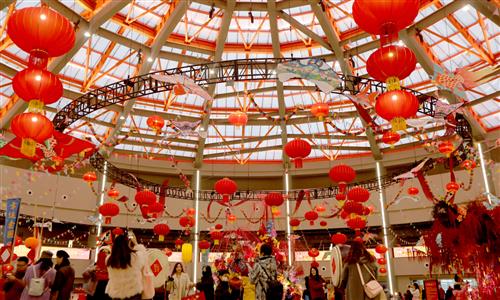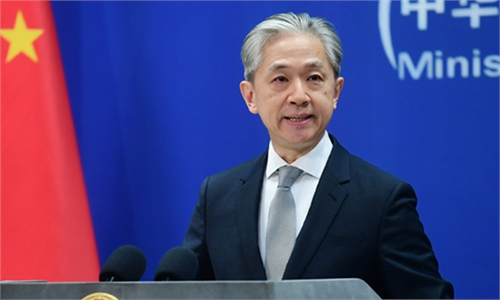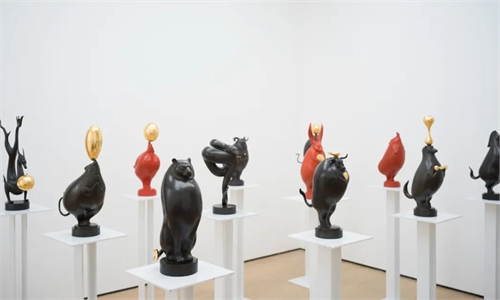ARTS / THEATER
Chinese and French artists retell opera masterpiece
Classic reimagined
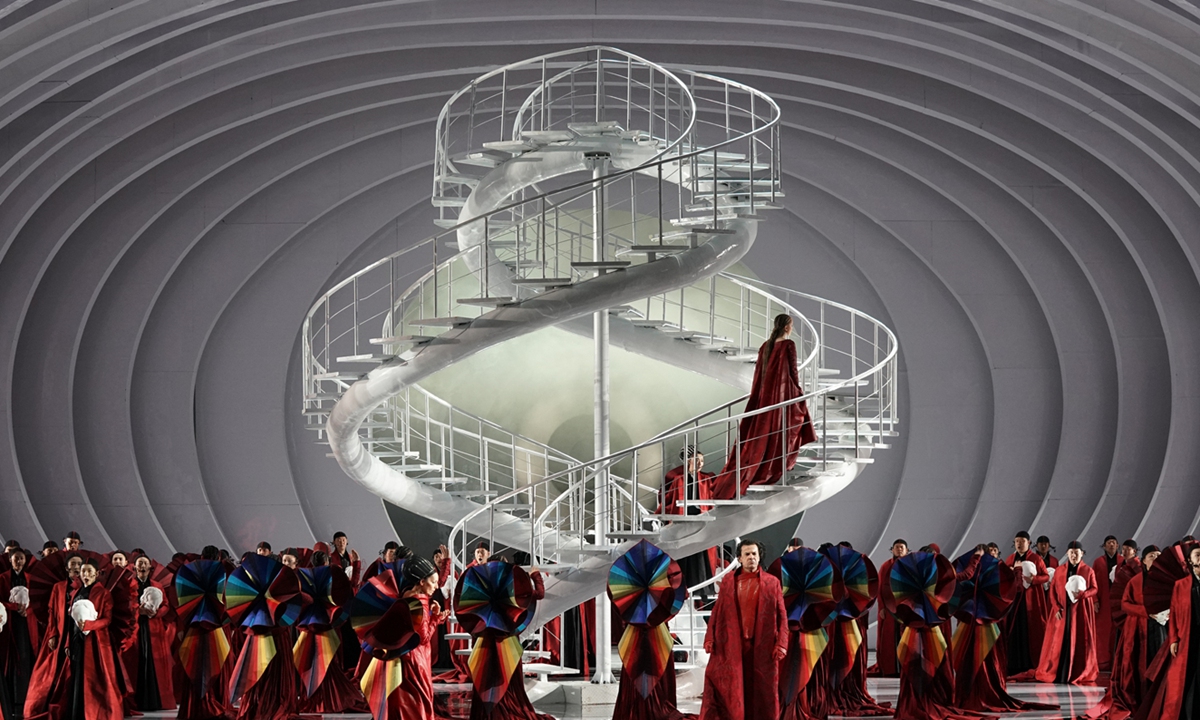
A scene from the opera Roméo et Juliette
Set in a grand overarching white structure with a spiral staircase in the middle of the stage, romance and tragedy come together in a new rendition of the operatic masterpiece Roméo et Juliette, in which a band of international artists endeavor to add their fresh interpretations to the classic saga.
As the curtain-raiser of the China-France Year of Culture and Tourism in Beijing to mark the 60th-anniversary of the establishment of diplomatic relations between China and France in 2024, the resplendent notes of Roméo et Juliette will grace the stage of the National Centre for the Performing Arts (NCPA) from Thursday to Sunday.
The opera will be presented in French by a stellar international and Chinese cast. To the romantic melodies by French composer Charles Gounod, the international cast finished their final dress rehearsal on Tuesday, when the live audience got a taste of the soaring music, exquisite duets and heart-stopping duets in the new version produced by the NCPA.
Roméo et Juliette is a five-act opera by Gounod adapted from a French libretto by Jules Barbier and Michel Carré, based on William Shakespeare's famous play of the same title. The opera made its debut at the Théâtre Lyrique, Paris on April 27, 1867.
Since its premiere, the opera has swiftly gained global acclaim, solidifying its status as one of Gounod's most celebrated lyrical works.
The libretto skillfully captures the essence of Shakespeare's drama, while Gouno's music beautifully portrays the tragic romance of the two protagonists. The opera remains an enduring testament to the timeless allure of Shakespearean tales, infused with an elegant musical aura by Gounod.
On the 200th birth anniversary of Gounod in 2018, acclaimed Italian director Stefano Poda was invited by the NCPA to reproduce the stage classic in Beijing.
Poda is known for his capability to balance traditional imagery and contemporary art.
His unique approach breathed new life into the retelling of one of the most tragic love stories of all time featuring feuding families, forbidden love and doomed fates.
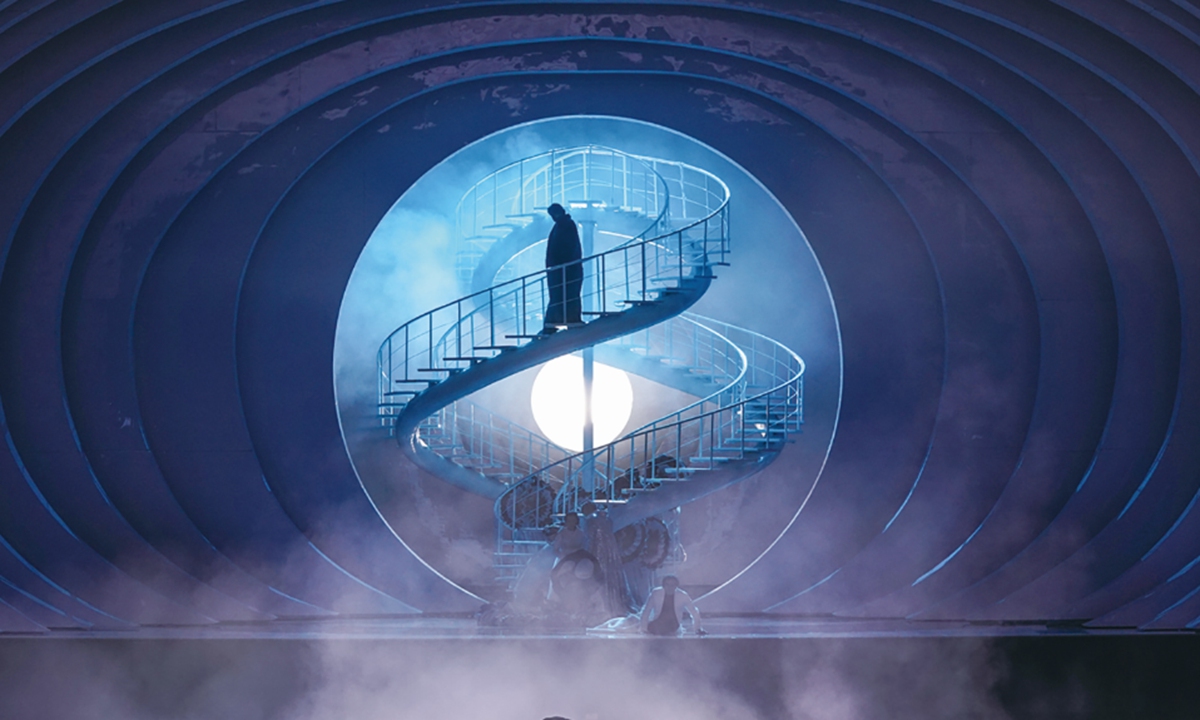
A scene from the opera Roméo et Juliette Photos: Courtesy of the National Centre for the Performing Arts
Fresh premiere
For the current project, Poda is to be responsible for direction, set design, costumes, lighting and the choreography of the opera that features French tenor Thomas Bettinger as Romeo, and soprano Ani Yorentz as Juliet in the international cast. The Chinese cast features tenor Wang Chuan as Romeo and soprano Zhang Meigui as Juliet. The new production will be conducted by renowned Chinese conductor and pianist Xu Zhong.
The choir and orchestra are also joined by elite artists from Italy and Germany.
Regarding the changes from the 2018 iteration, Poda told the Global Times that the production continually evolves compared with the previous show.
"The passage of time significantly influences the life of an artist. Likewise, all my performances embody vitality, authenticity and spontaneity. This means that for this new edition of Roméo et Juliette, it will not be a mere repetition but a fresh premiere. While the structure of the opera and the core of the performance remain the same, the mentality of each participant has undergone substantial changes," said the director.
Working with an international cast and combining the elements from the East and West in set and costume design, Poda said he tried to create something that transcends cultural and geographical boundaries.
"I endeavored to find a harmony between cultures, while showcasing the universality of emotions and Shakespeare. The set draws inspiration from both Western and Eastern architectures, while the costumes seamlessly blend European and Chinese styles," he said.
"At the heart of the staging is the union of two complementary parts, two opposing spheres that harmonize, akin to the Chinese concept of the symbiotic pair of yin and yang. Shakespeare would appreciate this rendition, where opposing tensions find tranquility in a perfect union that combines contrasts and conflicts," Poda noted.
He said he doesn't see himself as a director in the strict sense of the word, nor does he consider himself to be a scenographer, costume designer or choreographer.
"I always try not to present a definitive version of the performance, nor my pretentious interpretation. I seek to offer an open version for suggestions and questions. I believe that theater is the realm of dreams, and opera is a dimension that allows us to travel far from our real life," said he.
Universal language
China and France are eager to leverage the 60th anniversary of bilateral ties as a strategic opportunity to enhance high-level interactions and foster deeper collaboration in areas such as education, culture, and scientific research.
Zhang Meigui told the Global Times on Tuesday that the opera offers her a great opportunity to promote cultural exchanges between Chinese and French artists.
"The rehearsal is like a mutual learning process where I had a great deal of communication with our French counterparts. The opera builds a bridge for cultural exchanges between China and France," said Zhang.
"I feel honored to take on the role of an ambassador and contribute to fostering profound exchanges between our cultures," Zhang noted.
Wang Chuan said that music is the universal language that connects international artists.
"I think French music, with its grand melodies and sweeping lines, resonates well with Chinese audiences. The audience could identify with it as we have a similar tale of Liang Shanbo and Zhu Yingtai," Wang noted. With a stellar ensemble cast, the performance promises to be a momentous occasion, uniting audiences in a shared appreciation of cultural richness and artistic excellence.
